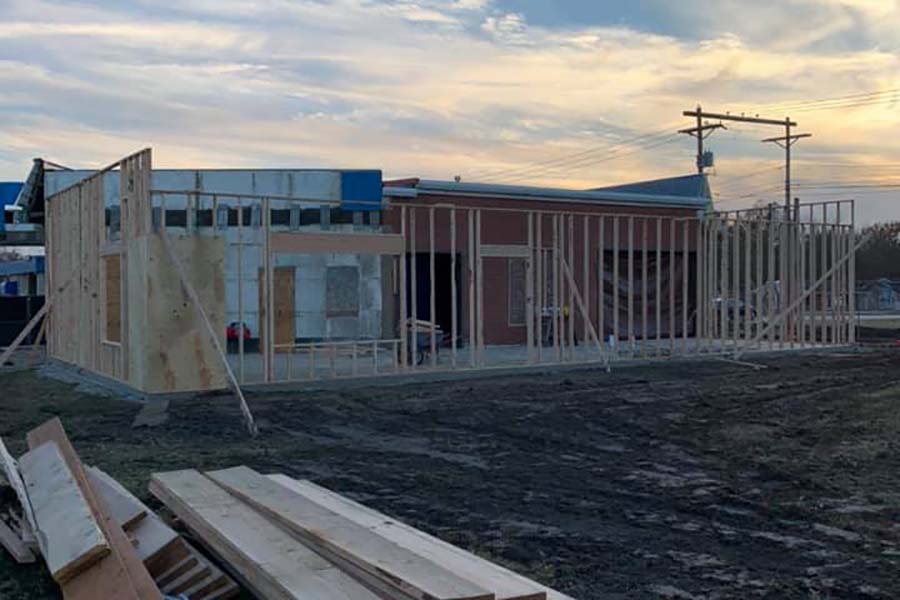
- Details
- By Chez Oxendine
- Economic Development
MIAMI, Okla. — COVID-19’s rapid spread through Oklahoma led to the closure of tribal casinos across the state.
The Ottawa Indians of Oklahoma’s High Winds Casino in Miami, Okla. was no exception. The pandemic led the tribe to close the facility for the entire month of March.
While gaming business has flourished since the casino reopened on June 1, the experience convinced the tribe it needed to focus more on diversifying its economy, Chief Ethel Cook told Tribal Business News.
One such step toward that diversification is the construction of a new bistro in an old fueling station building just off Route 66, which passes through Miami.
“We want to build a place that evokes 1950s and ’60s America,” Cook said. “Go in, get you a malt, a greasy hamburger, play a few songs on the jukebox and relax. We just thought it’d be a good attraction for Route 66. We’re going to have the Route 66 theme throughout it.”
It may seem strange to open a restaurant in response to COVID-19, but the Ottawa have accounted for the pandemic’s disruptions in their plans for the building. Along those lines, the diner will feature garage doors that can open to transform the restaurant into a more breathable, open-air space.
While the diner will offer a menu with sandwiches, ice cream, burgers and more, the tribe desires it to be more than a business venture by taking on a key role in the community, Cook said.
“We want to be a place where some of the older folks here in town can come and sit and relax, sort of a bistro, ice cream shop, teahouse kind of thing,” she said.
The property sat unused for nearly 20 years before tribal administrators decided what to do with it. The Ottawa initially purchased the business from a tribal member, Jack Robinson, as a way to bolster the tribe’s existing Otter Stop convenience store nearby.
Since then, the group has developed the Adawe Travel Plaza about 5 miles east of Miami. (“Adawe” is the name the Ottowa Indians call themselves.) Despite the various investments, the tribe left the shuttered fueling station untouched, until now.
“We had several ideas of what we wanted to do with the place, but they never panned out,” Cook said. “Now our newest board finally decided to do something with it.”
The tribe secured a $900,000 Housing and Urban Development grant to redevelop the property with the help of Commerce, Okla.-based Pruitt Brothers Construction LLC.
Because the building was so well constructed in the first place, much of the initial foundation will feature into the redesign, Cook said.
“There was some termite damage, but all things considered, the inside is built really good,” Cook said. “We’re not really having to do a lot of tear-out or anything, and we’re using a lot of the old brick on the inside for the decor. We’re trying to leave everything as authentic as we possibly could just because it goes with the theme.”
The tribe hopes the yet-to-be-named restaurant will become an economic driver tribe and aid in its diversification efforts, she said, citing the role the Ottawa and other tribes play in the economies of their surrounding communities.
“It’s another business venture to make the tribe viable and keep everything going and to help out our community,” Cook said.
Given the pandemic-related challenges tribal gaming operators faced this year, many have taken a deeper look at how to diversify their economies to not be so reliant on their casinos, which supplies a large portion of the revenue that goes to providing services for their members.
Gross gaming revenue hit an all-time high of $34.6 billion in the 2019 fiscal year, a year-over-year increase of 2.5 percent, according to data released this week by the National Indian Gaming Commission.
NIGC Vice Chair Kathryn Isom-Clause said the organization is preparing for “dramatically different” results in future reports that “reflect the effects of the pandemic on the industry.”
Writing in Tribal Government Gaming, a trade publication on tribal business administration, Steve Szapo, a senior partner at management consulting firm the Innovation Group of Companies, wrote that tribes face an imperative “to diversify their long-term economic and investment strategies,” particularly as profit margins from gaming are under pressure and more supply is poised to come to market.
Proper recovery from a COVID-19-induced recession could take some time as people recoup lost savings and discretionary income following periods of joblessness or increased expenses, according to Satzpor. He adds that tribes should consider other long-term investments, like energy.
Cook at the Ottawa Indians of Oklahoma agrees with the notion that tribes should begin to refocus their investment strategies. She wants the tribe to get away from being so reliant on the casino and convenience store, where jobs are often short term. Instead, Cook hopes to see the tribe’s “good location” used for more long-term investments that will bring long-lasting jobs to the area.
“I know one of these days I would like to see us do a type of industry,” Cook said. “I worked for and retired from the phone company, and I know there’s no more cradle-to-grave jobs. I would like to see an industry where kids could work 25 years and get benefits and things.”
